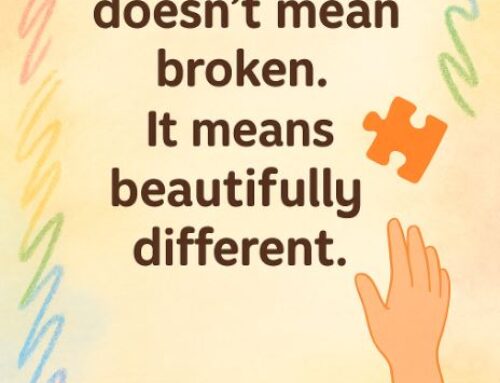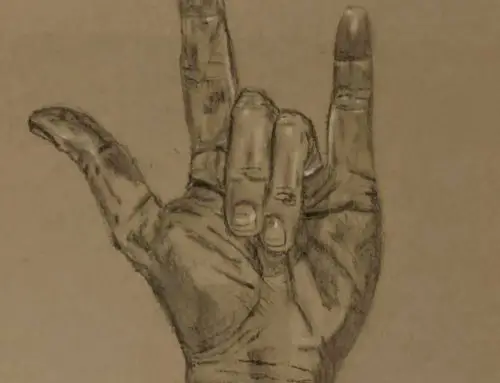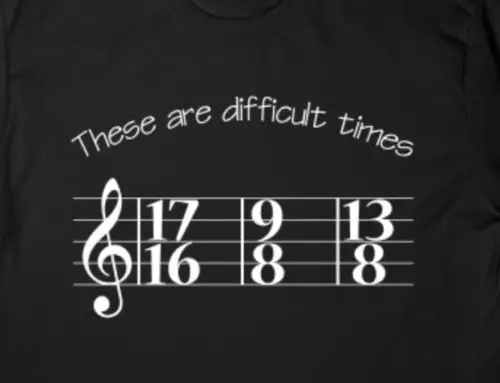Previously, I had shared why it’s so important for parents of special needs children to grieve their child’s diagnosis. Today, I want to expand on that and discuss the fact that this grieving process will go in cycles.

Why Grieving the Process Is a Cycle
I wish I could tell you that once you’ve grieved the diagnosis all of those heavy feelings would magically disappear and you would go on living life with your new reality without feeling the pain again. The reality is that this isn’t practical.
As we go on living our lives in our new reality there will always be reminders of your child’s diagnosis. These reminders can trigger us into feeling the hurt and loss all over again. As our children grow, so do their peers. We will continually see our child’s peers meeting milestones that our children may never meet. It hurts. It’s hard to see happening around us while feeling like we’re stuck in time.
While the grieving cycle may never truly end, there is hope in the fact that our periods of grief become shorter and less frequent with time.
Don’t Feel Guilty for Grieving
Often times the fact that we need to grieve our child’s diagnosis causes feelings of guilt. It’s easy to think we should be “over it” by now. We’ve grieved once, why are we feeling these feelings again? On top of that if we try to talk about our feelings with others who can’t relate we might get a guilt trip from them (usually unintentionally but it happens).
If you take away anything from this post, I hope it’s this. Don’t feel guilty for finding yourself grieving again. This isn’t a once and done process. As mentioned earlier there will always be things that will trigger the feelings you had when your child was first diagnosed.
Those feelings and emotions are normal. Not only are they normal but they are valid. You must allow yourself to feel and process these feelings. Raising children with special needs is hard, and it’s heavy. You can’t expect yourself to go down this journey and not feel these things.

So feel all the feels, and work through your emotions during the grieving cycle. Once you are able to process and work through your emotions you’ll come through on the other side and find true joy.
As our children grow, so do their peers. We will continually see our child's peers meeting #milestones that our children may never meet. #specialneedskids #specialneedsmom #specialneedsparenting #cerebralpalsy #autism Share on XEnjoy Your Beautiful Children
Most importantly, on your journey of raising your children enjoy them. They are amazing. No matter where you are currently on the grieving cycle we all love our children. Remember to enjoy them. Find activities you can do as a family together and enjoy them to the fullest. We are so blessed to be raising these extraordinary children.
If you are having a hard time working through your feelings of loss that come with a special needs diagnosis or are struggling with the grieving process, do not be afraid to seek professional help.







Thanks for sharing, but this doesn’t HELP. Thank you for permission to grieve the loss of a normal life, but you don’t say HOW YO LIVE WITH IT. How to live with the betrayal of your own body, how to live with the growing resentment against life or God or nature for stealing your child’s future, how to live with knowing you’ve RUINED a child’s life just because you wanted to ‘do the right thing.’ So, yeah, thanks for giving me permission to grieve, but that doesn’t help… wish it did.
It is hard, I won’t deny that. First, I don’t know your specific situation, but I’m willing to guess that it isn’t your fault. IF it is a result of something that could have been prevented, then a part of your grieving process would be to learn how to forgive yourself. We’re usually our own worst enemy when it comes to this, but I think it’s a crucial step in moving forward. The very best thing I did when I found that resentment was growing in me was that I started to see a therapist. I’m not implying that you need to, but that is how I dealt with it. Also, your child’s life isn’t ruined. I know when you’re mentally in a place of resentment that it’s easy to think that so I’m not trying to say your feelings are not valid, but I do believe no matter your child’s diagnosis they can have an amazing life. Personally, writing is very therapuetic for me. When I know there are things that I just need to say or get out but don’t know where to start I write it out. Before I know it feelings and emotions are pouring out me of and I usually feel much better for just letting them out. It’s a process, but an important one so you don’t stay stuck in these feelings of resentment.
I agree 10000%
Hi, I am so glad that I found your website. I am a Mom of 5 beautiful children, 4 are “normal” and 1 has Epilepsy and has special needs. It has been a long 4 years and I do find that some days I am okay and can make it a whole day without crying, and then out of the blue I am crying and a hot mess. It is good to know that I am not the only Mom who feels this way. Thank you for sharing this. Jenny
I’m glad you found this helpful. Sometimes, all we need is to know we’re not alone and that your emotions are valid.
This article was very helpful. I have 3 children twins boy/girl and a younger son. My son that is a twin has epilepsy and from severe seaizures has suffered several delays, brain damage and autism. I always felt guilty for going through the grieving process over again and different times for different stages. Thank you this article made me feel a bit better about that, because of course we even need to beat our selves up for simply feeling it all over again insert sarcasm . Thanks again it was nice to feel that I’m not alone.
not at all alone, I felt it again just a couple days ago pushing my daughter’s wheelchair out of ABA and watching other girls her age being picked up from dance class.
I began to mourn when I first noticed signs of abnormal behavior and missed milestones. My son is now 21 and I mourn every day for the “what might have been”.
I worry about what will become of him when we aren’t around anymore or unable to help.
It is heartbreaking still these 21 years later. It never goes away! I don’t feel guilty, I feel devestating loss for him and for us as his family.
My sentiments exactly Lora. My daughter now 26 will never marry, drive or even go out with friends… my heart grieves for her! I am getting some help in the afternoons to shower/personal care but that just helps us… how I wish things were different for her😪
Another thing I’m so afraid of is who will love her when I’m gone. NO ONE in my family has stepped up to visit. Ever
I still grieve my daughter’s deafness, she is now 31 years old. She is not close with any of her cousins, grandparents and even her dad because they can’t communicate. They never learned sign language. It makes me sad that she is left out of the conversation at family gatherings. I try to be the interpreter but no one gets that they can’t all talk at the same time. It is so frustrating! My heart hurts for her. She rarely comes home now that she is out on her own and has her own friends who are deaf or can communicate with her.
That is so discouraging when the family doesn’t attempt to learn how to communicate with her. I’m glad she’s found her community and hope you’ll see her soon.
My deaf, ASD son is now 17 & I’m starting to grieve all over again. We have a few close families & friends with kids roughly around the same age. One of my close friends asked me two months ago about what my son is going to do after he finishes highschool in 13 months and then it suddenly dawned on me how different life after school might be. I’m sick of holding it inside & feel like all I want to do is cry & lay in bed & eat to make myself feel better. I’ve tried professional help but I feel uneasy to talk about my feelings, especially when my husband dismisses so easily. I did attend therapy for a while and the CBT skills does work so I guess I just need to work at it. It does feel very isolating a lot of the time though. Does anyone have any advice?
We’re not as far along yet in our journey, but can relate to the feelings of anxiety already, and I’m sure those will increase as he gets older. Are there any support groups that you could join? We’ve found it very therapeutic to find even a single friend in a similar situation so that you have someone who will empathize, and can laugh & cry with you along the journey.
This morning, as I was having what I like to call a brief “pity party” I went searching for comfort and stumbled across this website! What a blessing I found it. I am always amazed at the many ways the Lord answers our prayers. I received my daughter’s diagnosis prenatally. The grief was overwhelming, but I progressed to a place of acceptance and hope. Imagine my surprise when she was born and the grief came flooding back. It was as if I was receiving her diagnosis for the first time. I had mistakenly thought I had worked through all of that! This was when I first experienced “the grieving cycle.” It’s comforting to know that, “it comes with the territory!”